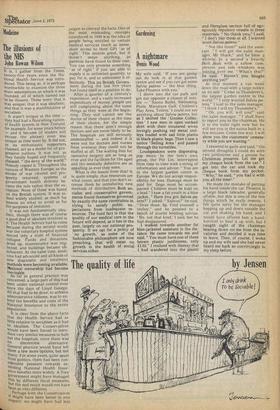The illusions of the MIS
John Rowan Wilson
It is, I gather from the Times, twenty-five years since the National Health Service was introduced. This being so, it is perhaps worthwhile to examine the three main assumptions on which it was founded, all of which turned out to be illusory. These were: that it was unique; that it was idealistic; and that it was a manifestation of socialism.
It wasn't unique at the time — they had had a flourishing national health system in New Zealand, for example, for some years before — and it became (if readers will excuse the phrase) even less unique as time went by. It did not, as its enthusiastic supporters claimed, act as a model for all progressive nations. It was not, as they fondly hoped and frequently claimed, "the envy of the world." Nobody copied it. Throughout the nations of Western Europe, as the smoke of war cleared and prosperity returned, systems of government health delivery became the rule rather than the exception. None of these was based On the British system. It was inJeed widely studied, as much for lessons on what to avoid as for the purposes of imitation.
It was not fundamentally idealistic, though there was of course a good deal of idealism involved in It. The Health Service had to come because during the second world War the voluntary hospital system moved into a state of financial collapse. Funds and donations dried up, maintenance was neglected, and buildings became obsolescent. At the same time, medicine had advanced and all kinds of new diagnostic and treatment Methods were becoming available. National ownership had become inevitable. As far as general practice was concerned, a large part of this had been under national control ever since the days of Lloyd George. All that had to be done, to achieve administrative tidiness, was to extend the benefits and costs of the National Insurance to the entire Population.
It is clear from the above facts that the Health Service had as little relation to socialism as it had to idealism. The Conservatives would have been forced to introduce very similar. measures to bale out the hospitals, since there was
no discernible alternative. General practice would have left them a few more -options, but not Many, For some years, quite apart from politics, there had been considerable pressure towards extending National Health Insur: ance benefits more widely. A Tory tlpyernment might have managed 's by different fiscal measures, §Mut the end result would not have been so very different. . Perhaps with the Conservatives It might have been better in one respect: we might have had less
jargon to conceal the facts. One of the most misleading concepts 'introduced in 1948 was the idea of people being entitled to certain medical services (such as immediate access to their GP) 'as of right.' This sounds great, but it 'doesn't mean anything, as paitents have found to their cost. You can only promise something ' as of right' if you are able to supply it in unlimited quantity, to pay for it, and to administer it effectively. This no British Goyernment during the last five years has found itself in a position to do. After a quarter of a century's experience, and a vastly increased expenditure of money, people are still complaining about the same things as they were at the beginning. They still cannot see the doctor of their choice at the time of their choice, for the simple reason that there aren't enough doctors and are never likely to be. The hospitals are still seriously understaffed — and indeed if it were not for doctors and nurses from overseas they could not be staffed at all. The waiting lists for operative surgery are as long -as ever and the facilities for the aged and the mentally defective are as appalling as ever they were. What is the lesson from this? It is, quite simply, that resources are what count, and that you don't increase them by introducing new methods of distribution. Both so
cialist and conservative governments found themselves governed
by exactly the same constraints in
trying to satisfy public expectations from inadequate re
sources. The hard fact is that the quality of our medical care in the future will depend, as it has in the past, largely on our national pro sperity. If we opt for a policy of 'no growth,' as some of the fashionable philosophers are now preaching, that will mean no growth in the health of social services either.


































 Previous page
Previous page